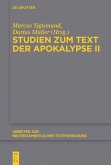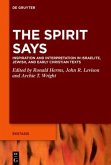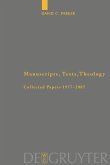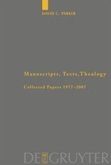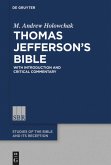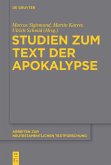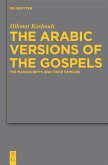2025 Manfred Lautenschlaeger Award for Theological Promise
The famous Codex Vaticanus is currently regarded as one of the most essential sources for reconstructing the Greek New Testament text. Although it had already been used by textual critics in the sixteenth century, the manuscript only rose to the prominent status it now holds during the nineteenth century. In this volume, Yi writes an extensive scholarly history of Codex Vaticanus and describes its changing perceptions among scholars, beginning from Desiderius Erasmus until its editio princeps prepared by Angelus Maius. By examining critical editions, analysing monographs and articles, considering book reviews and pamphlets, and delving into archive collections, Yi delineates the stages of the manuscript's progression from an ancient manuscript held at the Vatican Library to its designation as the 'Codex Vaticanus'. It is a study of the many individuals and their stories surrounding this very manuscript, stories about accessibility and the dissemination of knowledge, authority and head-on collisions between the most learned critics, and of continuity and changing paradigms in scholarship. All in all, this book sets out how Codex Vaticanus became the manuscript par excellence in the history of New Testament textual scholarship.
Hinweis: Dieser Artikel kann nur an eine deutsche Lieferadresse ausgeliefert werden.
The famous Codex Vaticanus is currently regarded as one of the most essential sources for reconstructing the Greek New Testament text. Although it had already been used by textual critics in the sixteenth century, the manuscript only rose to the prominent status it now holds during the nineteenth century. In this volume, Yi writes an extensive scholarly history of Codex Vaticanus and describes its changing perceptions among scholars, beginning from Desiderius Erasmus until its editio princeps prepared by Angelus Maius. By examining critical editions, analysing monographs and articles, considering book reviews and pamphlets, and delving into archive collections, Yi delineates the stages of the manuscript's progression from an ancient manuscript held at the Vatican Library to its designation as the 'Codex Vaticanus'. It is a study of the many individuals and their stories surrounding this very manuscript, stories about accessibility and the dissemination of knowledge, authority and head-on collisions between the most learned critics, and of continuity and changing paradigms in scholarship. All in all, this book sets out how Codex Vaticanus became the manuscript par excellence in the history of New Testament textual scholarship.
Hinweis: Dieser Artikel kann nur an eine deutsche Lieferadresse ausgeliefert werden.


